Old Testament
Genesis Exodus Leviticus Numbers Deuteronomy Joshua Judges Ruth 1 Samuel 2 Samuel 1 Kings 2 Kings 1 Chronicles 2 Chronicles Ezra Nehemiah Esther Job Psalms Proverbs Ecclesiastes Song of Solomon Isaiah Jeremiah Lamentations Ezekiel Daniel Hosea Joel Amos Obadiah Jonah Micah Nahum Habakkuk Zephaniah Haggai Zechariah MalachiActs 6:14 Similar Verses
Acts 6:14 Cross References
For we have heard him say, that this Jesus of Nazareth shall destroy this place, and shall change the customs which Moses delivered us.
Uncover the Rich Themes and Topics of This Bible Verse
Listed below are the Bible themes associated with Acts 6:14. We invite you to explore each theme to gain deeper insights into the Scriptures.
Acts 6:14 Cross Reference Verses
This section features a detailed cross-reference designed to enrich your understanding of the Scriptures. Below, you will find carefully selected verses that echo the themes and teachings related to Acts 6:14 KJV. Click on any image to explore detailed analyses of related Bible verses and uncover deeper theological insights.

Daniel 9:26 (KJV) »
And after threescore and two weeks shall Messiah be cut off, but not for himself: and the people of the prince that shall come shall destroy the city and the sanctuary; and the end thereof shall be with a flood, and unto the end of the war desolations are determined.
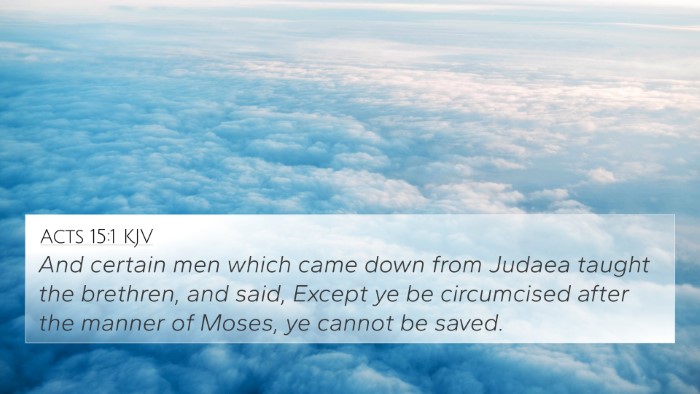
Acts 15:1 (KJV) »
And certain men which came down from Judaea taught the brethren, and said, Except ye be circumcised after the manner of Moses, ye cannot be saved.

Hebrews 12:26 (KJV) »
Whose voice then shook the earth: but now he hath promised, saying, Yet once more I shake not the earth only, but also heaven.

Acts 21:21 (KJV) »
And they are informed of thee, that thou teachest all the Jews which are among the Gentiles to forsake Moses, saying that they ought not to circumcise their children, neither to walk after the customs.
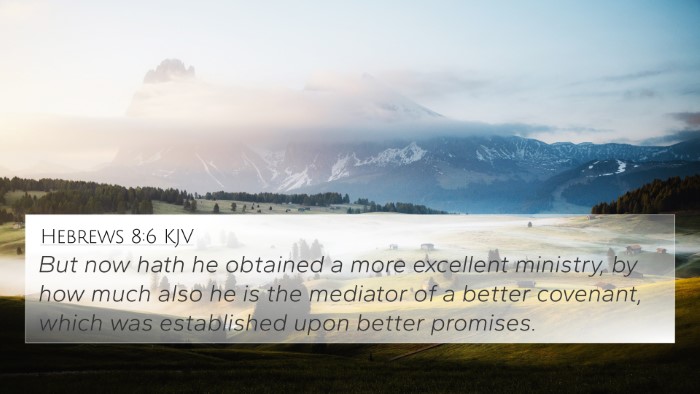
Hebrews 8:6 (KJV) »
But now hath he obtained a more excellent ministry, by how much also he is the mediator of a better covenant, which was established upon better promises.

John 4:21 (KJV) »
Jesus saith unto her, Woman, believe me, the hour cometh, when ye shall neither in this mountain, nor yet at Jerusalem, worship the Father.
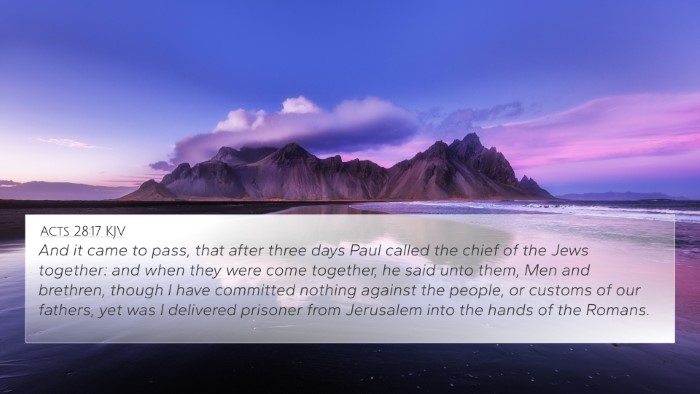
Acts 28:17 (KJV) »
And it came to pass, that after three days Paul called the chief of the Jews together: and when they were come together, he said unto them, Men and brethren, though I have committed nothing against the people, or customs of our fathers, yet was I delivered prisoner from Jerusalem into the hands of the Romans.

Galatians 3:23 (KJV) »
But before faith came, we were kept under the law, shut up unto the faith which should afterwards be revealed.

Galatians 4:3 (KJV) »
Even so we, when we were children, were in bondage under the elements of the world:

Galatians 3:19 (KJV) »
Wherefore then serveth the law? It was added because of transgressions, till the seed should come to whom the promise was made; and it was ordained by angels in the hand of a mediator.
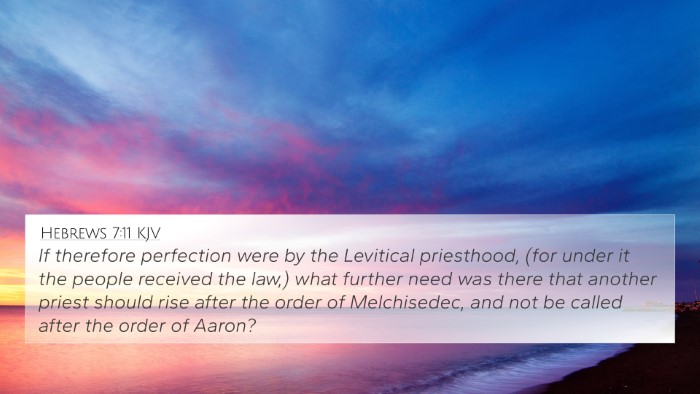
Hebrews 7:11 (KJV) »
If therefore perfection were by the Levitical priesthood, (for under it the people received the law,) what further need was there that another priest should rise after the order of Melchisedec, and not be called after the order of Aaron?
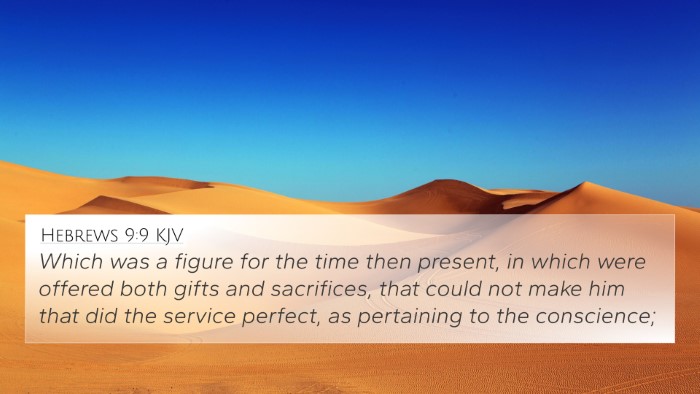
Hebrews 9:9 (KJV) »
Which was a figure for the time then present, in which were offered both gifts and sacrifices, that could not make him that did the service perfect, as pertaining to the conscience;

Hebrews 10:1 (KJV) »
For the law having a shadow of good things to come, and not the very image of the things, can never with those sacrifices which they offered year by year continually make the comers thereunto perfect.

Acts 26:3 (KJV) »
Especially because I know thee to be expert in all customs and questions which are among the Jews: wherefore I beseech thee to hear me patiently.
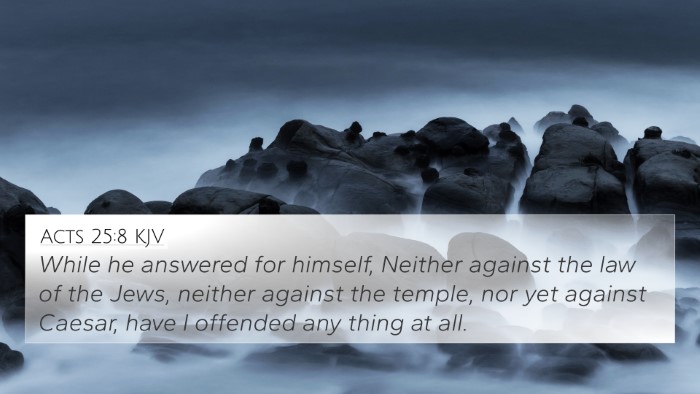
Acts 25:8 (KJV) »
While he answered for himself, Neither against the law of the Jews, neither against the temple, nor yet against Caesar, have I offended any thing at all.
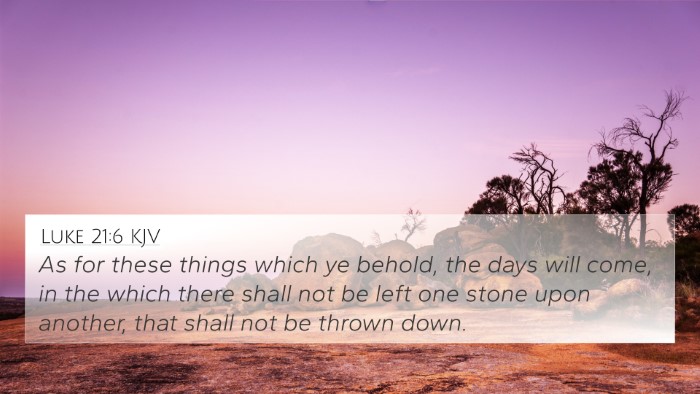
Luke 21:6 (KJV) »
As for these things which ye behold, the days will come, in the which there shall not be left one stone upon another, that shall not be thrown down.

Luke 21:24 (KJV) »
And they shall fall by the edge of the sword, and shall be led away captive into all nations: and Jerusalem shall be trodden down of the Gentiles, until the times of the Gentiles be fulfilled.

Luke 13:34 (KJV) »
O Jerusalem, Jerusalem, which killest the prophets, and stonest them that are sent unto thee; how often would I have gathered thy children together, as a hen doth gather her brood under her wings, and ye would not!

Isaiah 66:1 (KJV) »
Thus saith the LORD, The heaven is my throne, and the earth is my footstool: where is the house that ye build unto me? and where is the place of my rest?

Zechariah 14:2 (KJV) »
For I will gather all nations against Jerusalem to battle; and the city shall be taken, and the houses rifled, and the women ravished; and half of the city shall go forth into captivity, and the residue of the people shall not be cut off from the city.

Isaiah 66:19 (KJV) »
And I will set a sign among them, and I will send those that escape of them unto the nations, to Tarshish, Pul, and Lud, that draw the bow, to Tubal, and Javan, to the isles afar off, that have not heard my fame, neither have seen my glory; and they shall declare my glory among the Gentiles.

Jeremiah 26:12 (KJV) »
Then spake Jeremiah unto all the princes and to all the people, saying, The LORD sent me to prophesy against this house and against this city all the words that ye have heard.

Jeremiah 26:6 (KJV) »
Then will I make this house like Shiloh, and will make this city a curse to all the nations of the earth.

Jeremiah 7:4 (KJV) »
Trust ye not in lying words, saying, The temple of the LORD, The temple of the LORD, The temple of the LORD, are these.
Acts 6:14 Verse Analysis and Similar Verses
Understanding Acts 6:14
Acts 6:14 states: "For we have heard him say that this Jesus of Nazareth will destroy this place and will change the customs which Moses delivered us." This verse provides critical insight into the early Christian community's tumultuous relationship with religious authority and the transformative nature of Jesus' teachings.
Context and Background
The context of Acts 6:14 involves the early church, marked by rapid growth and the subsequent tensions with Jewish authorities. As the apostles preached the gospel, they encountered opposition, particularly regarding the identity and role of Jesus Christ. The accusation against Stephen, one of the first deacons, exemplifies this conflict.
Commentary Insights
- Matthew Henry's Commentary: Henry discusses the implications of the accusation against Stephen, noting that it reflects the perceived threat Jesus posed to the established Jewish religious order. Henry emphasizes that the "customs of Moses" represented the law that was deeply ingrained in Jewish identity, which Jesus came to fulfill and transform.
- Albert Barnes' Notes on the Bible: Barnes sheds light on the interpretation of Jesus' words concerning the temple and Jewish customs. He indicates that the phrase points to the radical shift that Jesus' ministry heralded, where the old covenant would give way to a new covenant, inviting both Jews and Gentiles into a personal relationship with God.
- Adam Clarke's Commentary: Clarke elaborates on the significance of the accusation itself, interpreting it as a misrepresentation of Jesus' teachings. He asserts that while Jesus did speak of temple destruction, his message was more about spiritual renewal and not literal destruction.
Significance of the Verse
Acts 6:14 is pivotal as it encapsulates the early Christians' challenges in articulating the nature of Jesus' mission against a backdrop of fierce traditionalism. It addresses:
- The conflict between old and new religious paradigms.
- The implications of faith in Jesus as disruptive to established practices.
- The early church's struggle for identity amid external opposition.
Cross-References
This verse can be understood more deeply through several related scripture passages:
- Matthew 5:17: Jesus states that He did not come to abolish the Law but to fulfill it, highlighting the continuity and divergence in His teachings.
- John 2:19-21: Jesus speaks of destroying the temple and raising it in three days, which alludes to His body; a crucial point in understanding the spiritual significance of His mission.
- Luke 21:6: Jesus predicts the destruction of the temple, which symbolizes the end of an era and the initiation of a new way of worship.
- Acts 7:48-50: Stephen, in his defense, reminds the council that God does not dwell in temples made by hands, reinforcing the transition to a spiritual communion.
- Hebrews 8:13: The author of Hebrews describes the old covenant as becoming obsolete, signifying a profound shift in the relationship between God and humanity.
- Galatians 3:24-25: Paul explains the law as a guardian until Christ came, emphasizing faith over ritual adherence.
- 1 Peter 2:9: This passage presents believers as a chosen people, indicating that spiritual identity transcends ethnic and ceremonial boundaries established in the Mosaic law.
Connections Between Bible Verses
Acts 6:14 serves as a focal point in linking various themes across scripture:
- The Old and New Covenants: Understanding the shift from law to grace.
- Jesus’ Teachings on the Temple: Exploring how Jesus redefined sacred spaces.
- Early Church and Jewish Tradition: Examining conflicts and conversions during the apostolic age.
- The Role of the Holy Spirit: Highlighting the empowerment of believers amidst persecution.
Thematic Bible Verse Connections
This verse speaks to broader biblical themes, such as:
- Transformation versus Tradition: The clash between the new faith and old customs.
- Identity in Christ: How believers are redefined in the context of Jesus’ life and teachings.
- Persecution for Faith: The consequences faced by early Christians holding fast to the new gospel.
Applying the Insights
For contemporary readers, understanding Acts 6:14 involves applying its lessons to modern faith practice:
- Evaluating Traditions: Assessing which traditions align with the heart of Jesus' teachings.
- Embracing Transformation: Being open to how faith may change personal and communal identity.
- Resisting Persecution: Finding strength in faith during challenges that mirror those faced by the early church.
Conclusion
Acts 6:14 is much more than an accusation directed at Stephen; it invites readers into a deeper understanding of the transformative nature of Jesus' teachings and the radical implications for all who claim His name. Observing cross-references can deepen our comprehension and appreciation of these scriptural truths, encouraging both personal reflection and communal dialogue.
In exploring scripture, one navigates the rich tapestry of inter-Biblical dialogue, revealing profound insights while fostering deeper connections between verses. By employing tools for Bible cross-referencing and a comprehensive Bible cross-reference guide, we unlock layers of meaning that not only educate but also inspire faith in action.


